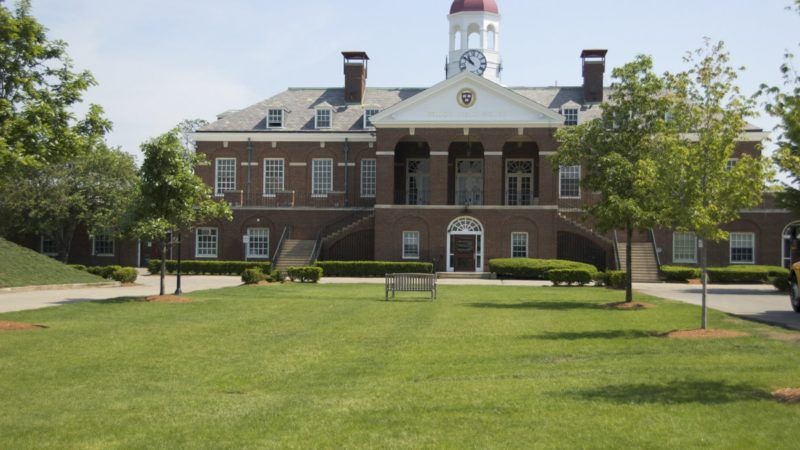Supreme Court's LGBT Discrimination Ruling Forces Harvard To End Ban on Single-Gender Clubs
Good news for free association at college!

Among the unexpected beneficiaries of last week's Supreme Court decision banning workplace discrimination against LGBT people are fraternities, sororities, and other single-gender college organizations.
This may take a little explanation. In 2016, Harvard leaders decided that they didn't like the school's exclusive, single-gender final clubs, dismissing them as creating "forms of privilege and exclusion at odds with [Harvard's] deepest values." It had stopped formally recognizing them in 1984, but they decided to put the screws to any student who continued to join them by denying them certain scholarships and prohibiting them from holding positions of leadership in campus organizations.
It was a terrible position to take, dismissing students' rights to free association. And while Harvard is a private college with its own power to decide what it will allow on campus, it was, as Reason's Robby Soave pointed out then, a deeply illiberal decision that fostered discrimination.
In June, the Supreme Court ruled in Bostock v. Clayton County, Georgia, that it's a violation of Title VII of the Civil Rights Act of 1964 to discriminate against an employee because he or she is gay or transgender. In an opinion written by Justice Neil Gorsuch, he explained that such discrimination falls under the rubric of discrimination on the basis of "sex."
This ruling significantly broadens how courts will analyze what sex discrimination means. And so on Monday, faced with a federal legal challenge from a group of fraternities and sororities accusing the college of sex discrimination, President Lawrence S. Bacow said the college would stop enforcing the ban.
As The Boston Globe noted in 2019, Harvard defended the ban from the lawsuit by attempting to argue that it applied equally to men and women—therefore it was not sex discrimination. This was very similar to arguments used to justify LGBT discrimination: That because gay men and gay women (and trans men and trans women) faced "equal" mistreatment, it was not sex-based discrimination. This didn't fly with the Supreme Court majority, who determined that the issue wasn't that the discrimination was "equal" between the sexes, but rather that the discrimination was based on sexual characteristics (whom somebody was attracted to or which gender they identified as).
Similarly, back in 2019, a federal judge rejecting Harvard's attempt to get the lawsuit dismissed said that it didn't matter if the policy banned both male and female clubs. "What matters is that the policy, as applied to any particular individual, draws distinctions based on the sex of that individual," Judge Nathaniel Gorton of the U.S. District Court for the District of Massachusetts wrote.
The legal writing was plainly on the wall. But as Harvard abandons the policy, it's abundantly clear they haven't really learned anything. They had good intentions because they were trying to prevent sex discrimination, Bacow argues in a letter sent to Harvard alumni. But they did so by instituting a different form of sex discrimination and now they've accepted that they will lose this lawsuit if they don't end their policy.
"The policy was adopted to advance the essential and unfinished work of making Harvard a more inclusive and welcoming environment for all our students—of creating a community in which students are not denied the opportunity to participate in aspects of undergraduate life simply because of their gender," Bacow wrote. "Harvard is fairer and better when a student's gender does not stand as a barrier to social opportunities while in college or inhibit students' access to alumni networks that can help enable opportunities later in life."
It's also fairer and better when students are permitted to privately organize in groups that serve their own needs and not be told by people who think they know better that they cannot. It's pretty rich that Harvard was making the exact same legal argument as those defending firing gay and transgender employees, but they didn't really recognize it because they saw their intentions as so very noble.


Show Comments (134)